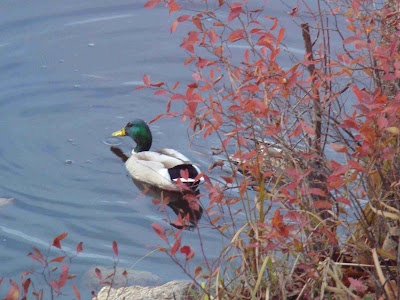Yesterday morning around 8:00 I was treated to an amazing experience: A family of four River Otters taking a tour of Lake Wicwas. I first noticed some ripples emanating from the shore, but they were larger and more numerous than the ducks usually make along the shoreline. Looking for the source though, I saw nothing. Then a head poked up out of the lake about 25 yards from the shore, and I assumed it was a beaver even though they don't usually dive, but rather swim on the surface. But suddenly three other heads appeared, started romping around with the first, and it was clear they were otters.
 |
| River Otters |
The four of them then proceeded to swim across the cove, diving for a stretch, then surfacing again to play. They would raise their heads high above the water to look around, and then lunge at one another, diving up and down with their backs arched as they dove, and their long, tapered tails following along behind.
Otters seem to be the polar opposite of beavers. Beavers are very focused on their work, always swimming purposely in a straight line, knowing exactly where they intend to go. Otters on the other hand are very playful, spending a lot time just seeming to enjoy themselves. Maybe it's the difference between being an herbivore where one must store up a whole winter's worth of food when it's available, versus being a carnivore, where fish are available year 'round. Otters are extrememly capable fishers, leaving them lots of time to play.
I was too mesmerized watching through binoculars to pick up the camera until they were almost around the point. One of them started to run up on terre firma, but then came back down and they all disappeared around the corner into the next cove to continue their morning escapades.
Otters often have four offspring, so it's possible they were siblings - I don't know if parents stay with their mom this long into the season or not. It was another of those wonderful nature moments we are so fortunate to be able to experience in this unique habitat.
We also had the first sighting of northern birds migrating south through New Hampshire, with a pair of hooded mergansers stopping by Lake Wicwas for a rest and a food stop.
 |
| Hooded Merganser |
Other than that one pair or mergansers, we saw two pairs of mallards. Also, the forest birds were more visible, with chick-a-dees, nut hatches and woodpeckers more active than in recent weeks.
We again found more fresh beaver cuts near the lake, including one witch hazel tree which was cut so recently that its sap was still flowing. Closer inspection revealed a swarm of small flying insects feasting on the readily-available source of high-sugar content fluid. I have no idea what species of insect it is, but they appear to be vegetarians, which is good by me!
 |
| Insects Feeding on Fresh Beaver Stump |
This afternoon we checked on the status of the work at Child's Park, and found the building fully enclosed, the water fountains installed, and the playground being constructed!
The playground is really neat, with good sturdy structures representing key landmarks of Meredith Center: The Meredith Center Fire Station and the Meredith Center Store. The kids will love it!
 |
| Child's Park's New Playground |



















